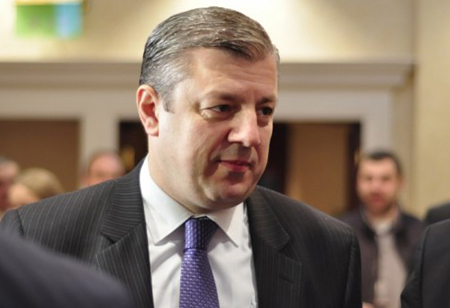Georgia’s Economy Minister voices plans to overcome economic challenges

Georgia’s Economy Minister Giorgi Kvirikashvili has some ambitious ways to help the country break free from current economic crisis.
In Parliament today Kvirikashvili introduced a three-year plan involving short-term, mid-term and long term goals to help solve the country overcome the economic challenges currently facing the nation.
The short-term plan involved privatization of state-owned assets and surrounded the period from now until June. The mid-term goals should be completed by the end of the year and the long-term goals extended out to 2017, Kvirikashvili said.
To address a short-term goal of privatization, Kvirikashvili presented a list of assets that will be sold. He said privatisation of several assets was "a real investment in the country” and through this, the Government aimed to mobilise about $300-350 million USD (655-765 million GEL) through the sale of about 20 assets.
"The short-term plan is about speeding up privatisation. The same plan includes raising the awareness of Georgia and attracting more tourists. The plan is also about attracting more Foreign Direct Investments (FDI) in Georgia. It includes reducing the administrative costs as well and implementing the large infrastructural projects.”
Kvirikashvili said this process would require the taking of additional loans from different financial institutions.
"It is very important to make legislative changes that will stimulate the business sector in Georgia. The Ministry of Economy is working in this direction,” Kvirikashvili said.
While talking about attracting more FDI in Georgia, Kvirikashvili expressed his excitement that the number of FDIs in Georgia had reached a five-year high.
Preliminary data released by Geostat, the National Statistics Office of Georgia, noted the number of FDIs in Georgia at the end of 2014 amounted to $1.27 billion USD. This was a 39 percent increase on the same data of 2013.
Looking ahead, Kvirikashvili said "very important changes” in terms of tax liberalisation will be announced in the near future.
Furthermore, in order to promote exports, the new Georgia Export Promotion Institute will begin operating in May. The Institute is a daughter company of state-owned shareholding company the Partnership Fund. Kvirikashvili said negotiations with German and Italian export promoting institutes had taken place and these parties would help Georgia’s Export Promotion Institute to develop.
The recent devaluation of Georgia’s national currency, the Lari, was also discussed, and the Minister emphasized the fall in value was a result of external shocks. In the past six months the Lari has depreciated by 23 percent against the US dollar. Kvirikashvili noted Georgia’s neighbouring countries were also affected by depreciating currencies and action was in place to stabilise the Lari.
In terms of privatisation, it was expected the sale of about 20 state-owned assets would generate about $300-350 million USD (655-765 million GEL). This money would mainly be spend on new infrastructure projects.
"The largest part of the mobilised money will be spent on infrastructural projects, which will be an important factor for growing the economy. Economic growth is reduced and the prognosis has dropped from five to two percent. This is a fact,” Kvirikashvili said.
Assets that will be sold and privatised includes:
- The Historical building of the National Bank of Georgia;
- The Ministry of Economy building;
- The former Bobokvati presidential residence in Adjara region;
- Tskneti Governmental residential buildings at the prestigious resort near Tbilisi;
- The building of Georgia’s Post Office;
- A hotel complex in Gudauri;
- The Presidential Residence on Atoneli St. (This was former building of the US Embassy to Georgia. The Ministry of Foreign Affairs now planned to move there); and
- The Tbilisi Balneological resort in Ortachala district.
The Batumi Technological University has already been privatised.
As for improving the country’s touristic potential, Kvirikashvili announced the Ministry had come up with an idea to create a calendar of large-scale international concerts and festivals.
At the same time, he announced Georgia was currently negotiating with several low cost air carriers including Easy Jet (British), Ryanair (Irish) and Air Berlin (German).
In this respect, Kvirikashvili said it was also important to support local airline companies.
Finally, in order to create a better touristic environment in Georgia, Kvirikashvili believed it would be beneficial to liberalise the visa regime which was adopted by the state in September 2014.
 Tweet
Tweet  Share
Share